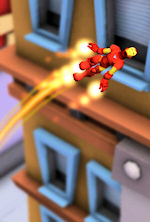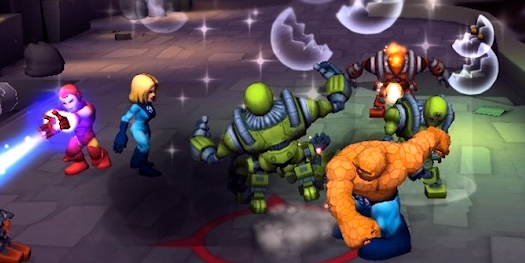 Since I started working for Massively, the one upcoming game I’ve gotten to check out in person more than any other is a cute little game from Gazillion and the Amazing Society called Super Hero Squad Online under this quaint, obscure IP called “Marvel comics.” Gazillion’s devs have actually secured the rights to Marvel games for something like the next 10 years, and they are milking it — SHSO is just one in a string of MMOs and other games that will feature Wolverine, Spider-Man, Storm, and the rest. In fact, SHSO is the company’s kid-centric entry to an increasingly crowded superhero market that includes City of Heroes, Champions Online, DC Universe Online, and Gazillion’s own Marvel Universe Online — and those are just the MMOs. Of course, none of those MMOs is trying to be kid-friendly; DCUO, for example, appears to be cornering the market on ultra-violence not suitable for little kids at all. So maybe the world does need a cutesy superhero game that evokes a bit more Incredibles than the Joker-on-a-serial-killing-spree.
Since I started working for Massively, the one upcoming game I’ve gotten to check out in person more than any other is a cute little game from Gazillion and the Amazing Society called Super Hero Squad Online under this quaint, obscure IP called “Marvel comics.” Gazillion’s devs have actually secured the rights to Marvel games for something like the next 10 years, and they are milking it — SHSO is just one in a string of MMOs and other games that will feature Wolverine, Spider-Man, Storm, and the rest. In fact, SHSO is the company’s kid-centric entry to an increasingly crowded superhero market that includes City of Heroes, Champions Online, DC Universe Online, and Gazillion’s own Marvel Universe Online — and those are just the MMOs. Of course, none of those MMOs is trying to be kid-friendly; DCUO, for example, appears to be cornering the market on ultra-violence not suitable for little kids at all. So maybe the world does need a cutesy superhero game that evokes a bit more Incredibles than the Joker-on-a-serial-killing-spree.
And yet, during my first tour of the game back in May and my second peek in August, all I could think was: Boy, my dad would love this.
Superheroes are doing rather well for themselves lately. Not a year goes by without a few new superhero movies eating up the big screen. In some ways, they’re filling everyone’s Mary-Sue-ism or some communal interest in Byronic (anti-)heroes. For my part, my interest in superheroes really began with City of Heroes and ramped up when I returned to that game in 2009 (thanks to vast mechanics improvements). More than any other game I’ve ever played, CoH encourages extreme creativity. You’re not picking a class and a name and a face too small for anyone to see; you’re picking wild costumes and splashy powers, too. You’re being tasked with creating an entire fantastical identity. You can effectively design everything about the character and then direct his moral progress as you play. Unlike other MMOs (which practically design your concept for you), superhero games force you to play pretend. They make you a kid again. They function like toys.
And that’s exactly what SHSO is — a toy.
 Most MMOs, of course, are not toys. They barely even resemble the pen-and-paper roleplaying games that spawned the genre. They’re sort of like online board games. There are rules. There’s not much creativity. They require a group. Everyone sits down and tackles the challenge, either against each other or against some intangible other (the clock, the AI, the laws of gravity in a particularly heated game of Jenga). You probably invest in them some limited amount of focus and concentration, and even if you’re not a competitive soul, you still have a goal: to win (or to lose in some way that allows you to win socially).
Most MMOs, of course, are not toys. They barely even resemble the pen-and-paper roleplaying games that spawned the genre. They’re sort of like online board games. There are rules. There’s not much creativity. They require a group. Everyone sits down and tackles the challenge, either against each other or against some intangible other (the clock, the AI, the laws of gravity in a particularly heated game of Jenga). You probably invest in them some limited amount of focus and concentration, and even if you’re not a competitive soul, you still have a goal: to win (or to lose in some way that allows you to win socially).
Contrast that to other toys with which you may have played as a child. Dolls? Action figures? For my kid brother and me, it was LEGOs. Buckets of blocks provided us with a sandbox for creativity, endless storytelling, pure escapism. We built entire cities and controlled dozens of characters between us to populate those towns. We were roleplaying before we knew what the word meant.
It’s strange, then, that I’ve slowly returned to that kind of gameplay as I’ve gotten older. In my 20s, I would have called myself a more hardcore gamer — not necessarily a hardcore raider or hardcore PvPer, although I did those things too — but a hardcore casual gamer, someone who doesn’t play 24-7 but who plays pretty hard when she’s actually playing. Even the sandboxes I love — like Star Wars Galaxies and Ultima Online — are the sort of hardcore sandboxes that require a lot of time and a lot of serious effort. They practically become a lifestyle, a sub-life, an obligation — they’re fishbowls, and you’d better care for your online goldfish or it will die.
But since I turned 30, I’ve been veering away from that kind of hardcore play. Part of that is because of my new job and Paul’s demanding career, I admit. My job in particular has turned me off from the sorts of games that require a lot of thinly veiled work, since my real work revolves around games all day. When I sit down to play, I want instant escapism. I want to feel delighted. I’m not really sure that I want to log into SWG and move my harvesters and start my factories nowadays. That’s, well, work. And the payoff — having an outrageously successful mercantile empire in a game — might not be worth the investment, not when there are “toy” games popping up and offering more instant gratification for the limited time we have available (with fees that more fairly charge me for the time I actually participate). I suppose I’ve realized that the MMOs I’ve liked up until now just helped me pass the time, whereas the toy MMOs I’m drawn to nowadays provide concentrated doses of fun.
But no one takes toy games seriously. “That can’t be for me,” players say. “It looks fun and easy.” It amazes me that we’ve allowed grind games from the last century determine how serious players must spend their time. If it’s not mind-numbingly tedious and repetitive — if there’s no massive grind-based barrier-to-entry that only those with unrealistic excess time can surmount — the traditional MMO gamer sneers at it as being casual fluff. Then again, the traditional gamer has been losing ground for years, starting with World of Warcraft (ever the hardcore gamer’s whipping boy). In our quest to grow up, the first generation of MMO gamers is finally figuring out how to be a kid again.
And that is really why I think SHSO, with its vibrant visuals and bite-sized missions and Sims-like personal quarters and splashy Diablo-style combat and staggering lack of grind, is going to be an awesome game. Not because it will appeal to little kids, but because it’s a delicious little snackgasm that can fit into the busy lives of big kids while rising far above the strata of tacky flash games. Remember, we’re still in an era when the reigning MMO companies insist that teaming up with 20 of one’s closest enemies to take down a boss for a paltry chance at a loot drop is a desirable and fun activity, in spite of statistics that show how few customers actually sample these gameplay elements in practice. Big kids have huge chunks of disposable income, an ever-widening array of choices, nostalgia for childhood, and less time than ever. Which type of game do you think will win in the end?
